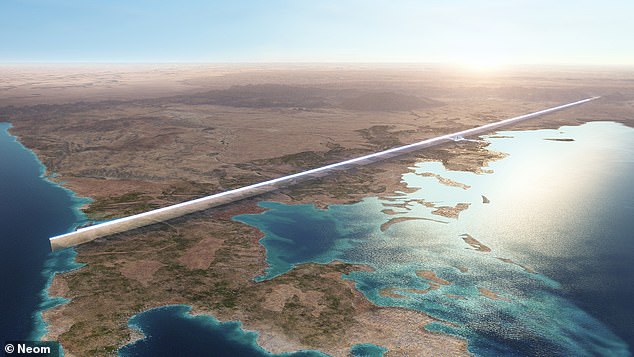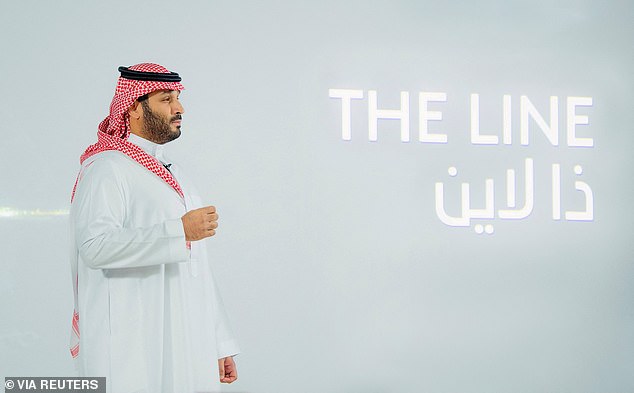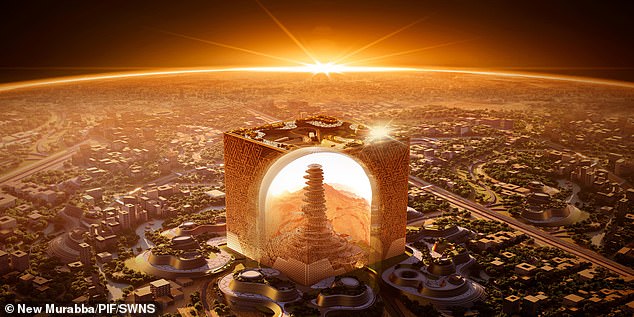Saudi Arabia has paused on its sprawling $2trillion Vision 2030 strategy amid falling oil prices and a realisation that far too much money had been spent already.
Vision 2030 aims to diversify the kingdom away from oil and instead towards becoming a global hub of tourism, technology and entertainment.
Set up in 2016, Riyadh threw hundreds of billions of dollars at its gigaprojects, the likes of which include The Line, a novel city set to be hundreds of miles long that was meant to be a beacon of what life in the future would look like.
But underpinning Vision 2030 was the assumption that oil, still Saudi Arabia’s biggest export, would remain at $100 a barrel or higher.
Currently at $60 or so per barrel, the black stuff hasn’t hit triple digits since 2022 – a major problem for Saudi Arabia’s crown prince Mohammed bin Salman.
Jerry Inzerillo, an American-born executive who is a key adviser to MBS, said the nation was ‘making a course correction’ in light of the country’s financial situation.
He told the Times that because oil accounts for over half of the nation’s economy, it is now being forced to ‘be more conservative’.
‘Saudi Arabia is a very wealthy country but there is a limit on how much it can spend relative to GDP’, he admitted.
One of the most drastic examples of conservatism in Vision 2030 is The Line. Initially imagined to be 110 miles long and 1,600ft tall, the linear settlement was designed to have no cars, streets or net carbon emissions.

The Line (pictured) has now been massively scaled back, only set to be a few miles long
It was also designed to hold a population of nine million, which is currently a quarter of the country.
But the project has now been massively scaled back, only set to be a few miles long.
Inzerillo admitted The Line ‘might more accurately have been positioned as a laboratory of what quality of life might look like in 2040’.
It is now set to house just 300,000 people.
Many gigaprojects are also being delayed. Trojena, a mountain resort, was meant to host the 2029 Asian Winter Games, using man-made snow from water collected from a man-made lake.
But it simply won’t be ready in time, according to Saudi officials who said: ‘It will be three or four years late, likely ready by 2032 in time for the 2033 games’.
Instead, South Korea is set to take up the slack of the major competition.
Also delayed is the world’s largest downtown district, New Murabba in Riyadh.
The new development, set to house 300,000 people, is now set to be opened by 2040, though this may be pushed back even further, according to Michael Dyke, New Murabba’s chief executive.

Saudi Crown Prince Mohammed Bin Salman announces a zero-carbon city called ‘The Line’ to be built at NEOM in northwestern Saudi Arabia, January 10, 2021

Trojena, a mountain resort, (pictured) was meant to host the 2029 Asian Winter Games, using man-made snow from water collected from a man-made lake
He told the Times: ‘We took a decision to slow down before speeding up. The worst thing is to make lots of fanfare only to find that you don’t have substance behind it’.
Some gigaprojects have been outright cancelled, having caught the fury of MBS. Sindalah, a $1billion island resort in the Red Sea, was binned shortly after its VIP opening beach party that was attended by Alicia Keys and Will Smith.
Designed to house the world’s largest superyachts, MBS was furious at ‘design flaws’ and ‘wasteful’ spending.
The island’s designers were infamously caught using rare and expensive crocodile skins to cover the interior of one building.
Many projects, however, are set to be completed on time due to hard and fast deadlines.
The 11 stadiums needed to host the 2034 men’s World Cup, as well as the infrastructure needed for the Expo 2030 trade fair, are set to be completed on time.
And it hasn’t stopped the kingdom’s major purchases of entertainment assets, the most recent of which was Electronic Arts, the powerhouse developer behind the FIFA and Battlefield video games.
Saudi Arabia’s wealth fund bought the company outright for $55billion, along with funding a massive AI firm that is building vast data centres in the desert.

Also delayed is the world’s largest downtown district, New Murabba in Riyadh (pictured)
Faisal Alibrahim, Saudi’s economy minister, said: ‘We’re reprioritising a little bit towards sectors that need it the most and and today it’s technology, artificial intelligence’.
Hype and fertile economic grounds carried Saudi Arabia for many years, with one anonymous business leader admitting: ‘We had a weakness – hype and glitz. I call it the Dubai disease. We picked it up from Dubai. Everything became a glitzy video’.
But this hype, and the failure to materially build on it, have distracted the country from ‘the substantive, material progress on key issues, which are having a much bigger impact on the labour market and economic growth than splashy real estate developments’.
And Saudi officials said they need significant time to recover, otherwise more projects may be further delayed or cancelled: ‘We need another two to three years of high oil prices to pay down our debts. I’m optimistic that price rises will be coming’.
